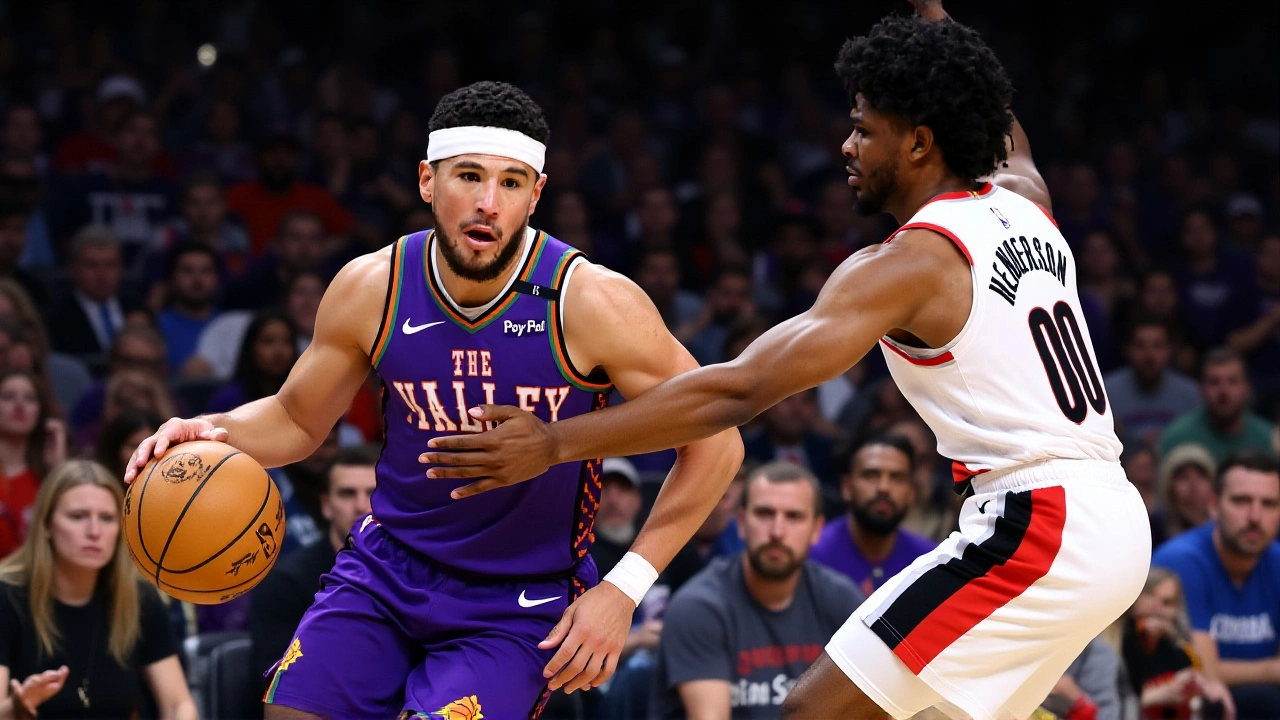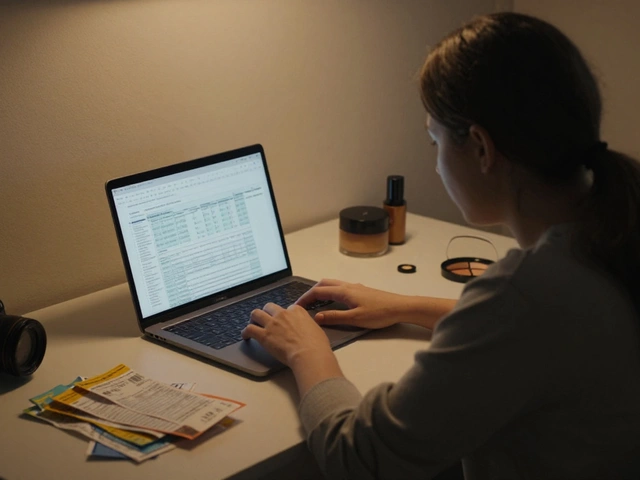The Phoenix Suns didn’t just win on Tuesday night—they rewrote the script. Beating the Portland Trail Blazers 127-110 at the Moda Center, the Suns turned a tight game into a statement with a 36-21 third-quarter explosion that left Portland gasping. Devin Booker, the Suns’ All-Star guard, led the charge with 19 points, but it wasn’t just his scoring. It was the timing. The game was tied at 64-64 at halftime after an 8-0 Blazers run, but the second half belonged to Phoenix. And it wasn’t even close.
A Third Quarter That Changed Everything
At 8:47 in the third, Ryan Dunn threw down a thunderous dunk that pushed the Suns’ lead to 80-63. That was the moment Portland’s hopes started to evaporate. The Blazers, who entered the game fifth in the NBA in three-point attempts, went ice-cold: 10-for-41 from deep (24.4%). They missed 11 consecutive threes at one stretch. Meanwhile, the Suns moved the ball with surgical precision, finding open shooters and attacking the rim with relentless energy.
By the end of the quarter, Phoenix had outscored Portland by 15 points. It was the kind of run that doesn’t just win games—it breaks teams. The Suns’ offense, which had been sputtering in the first half, suddenly looked like the 2024 Western Conference finals version of themselves. They didn’t rely on hero ball. They relied on rhythm. And it worked.
Dillon Brooks Hits a Quiet Milestone
While Booker got the headlines, Dillon Brooks quietly reached a major career milestone. Late in the first half, with a driving layup and a subsequent assist, he became the 128th player in NBA history to reach 1,000 career assists. He finished with 12 points and four assists—efficient, physical, and unflashy. It’s the kind of performance that doesn’t show up on highlight reels but keeps a team together. Brooks has spent years as a defensive pest and glue guy. On Tuesday, he proved he’s more than that.
His presence on the floor helped contain Deni Avdija, Portland’s leading scorer (26.0 ppg entering the game), who managed just 18 points on 6-of-18 shooting. Avdija, who had been averaging 4.8 assists, was held to just three. The Suns’ defense didn’t just guard him—they made him work for every inch.
Pre-Game Predictions Missed the Mark
Before tipoff, Alex Hinton of Action Network had called the Trail Blazers a 2.5-point favorite, with the over/under set at 236.5. He even recommended a parlay that included Avdija scoring 30+ points and Booker dishing out six assists. Neither happened. Avdija didn’t crack 20. Booker had just four assists. But the total? It squeaked over—237 points—thanks almost entirely to Phoenix’s 36-point third quarter. The game didn’t go the way analysts expected. It went the way the Suns wanted.
Portland’s offense, built on spacing and three-point volume, collapsed under pressure. The Blazers shot 38% from the field overall. They turned the ball over 16 times. And their bench, which had been a strength all season, managed just 22 points. Meanwhile, Phoenix’s reserves—led by Kevin Porter Jr. and Mark Williams—combined for 38 points and 14 rebounds.
What This Means for Both Teams
The loss drops Portland to 6-7 on the season, their third straight defeat and fifth in six games. Their playoff hopes, already thin, are now hanging by a thread. They’ve lost three home games in a row. Their identity—fast, flashy, three-point reliant—isn’t working without consistency from the arc. And with Shaedon Sharpe (22.1 ppg) held to 15 points on 5-of-14 shooting, the offense has no reliable second option beyond Avdija.
For the Suns? This win is a turning point. They’re now 9-6 overall, 3-4 on the road. Their third-quarter dominance—now a season-long trend—has become their signature. They’ve outscored opponents by an average of 11.3 points in the third this season, the best mark in the NBA. They’re not just surviving close games. They’re killing them.
Up next: Phoenix hosts the Minnesota Timberwolves on Friday night. Minnesota, 10-5 and riding a four-game win streak, will test the Suns’ depth. But if Tuesday’s performance is any indication, Phoenix is no longer just a contender. They’re becoming a threat.
What’s Next for Portland?
The Trail Blazers, meanwhile, face the Chicago Bulls on Wednesday night—just 24 hours after this loss. It’s a short turnaround, and their confidence is shaken. Coach Chauncey Billups has publicly questioned his team’s defensive focus. He’s also hinted at lineup changes, possibly giving more minutes to rookie guard Brandon Miller to add scoring punch. But without a reliable outside shooter to space the floor, even the best lineups will struggle.
Their next five games are against teams with winning records. If they don’t fix their shooting—and fast—they could be looking at a long offseason.
Frequently Asked Questions
How did Devin Booker’s performance compare to his season average?
Booker entered the game averaging 24.3 points per game, so his 19-point night was slightly below his norm. But efficiency mattered more than volume—he shot 8-of-15 from the field and 3-of-5 from three, with zero turnovers. His ability to control the pace and make smart reads in transition was more valuable than raw scoring, especially as the Suns leaned on him to close out the third quarter.
Why did Portland’s three-point shooting fail so badly?
The Suns’ defensive scheme focused on collapsing on drives and contesting every catch-and-shoot opportunity. Portland’s shooters—especially Sharpe and Avdija—were forced into difficult, contested threes. They also missed open looks, a sign of mental fatigue. After missing 11 straight from deep, confidence eroded. Portland’s 24.4% shooting from three was their worst of the season and the third-worst in the NBA this year.
What does Dillon Brooks’ 1,000 assists milestone mean for his legacy?
Reaching 1,000 assists as a forward with a reputation for toughness is rare. Brooks is one of just 12 players since 2010 to hit that mark while averaging under 15 points per game. It shows his unselfishness and basketball IQ. He’s not a traditional playmaker, but his ability to find cutters and kick out to open shooters has quietly made him one of the league’s most valuable role players.
How has Phoenix’s third-quarter performance changed their season?
The Suns are outscoring opponents by 11.3 points per game in the third quarter—the best in the NBA. That’s turned six close losses from last season into four wins this year. Their coaching staff credits improved defensive rotations and faster transition play. It’s not luck. It’s preparation. They’ve drilled third-quarter scenarios in practice since training camp.
What’s the outlook for Portland’s playoff chances?
Portland is currently 11th in the Western Conference, just behind the Warriors and ahead of the Hornets. To make the play-in, they need to win at least 7 of their next 10. But with a 3-7 record in games against .500 or better teams, and their shooting collapse showing no signs of improvement, their odds are now below 20%. A trade deadline move might be their only lifeline.
How did the game’s total points exceed the over/under despite Portland’s poor shooting?
Even though Portland shot poorly from three, they still scored 110 points thanks to 42 free throw attempts and 18 offensive rebounds. The Suns, meanwhile, scored efficiently in the paint and on fast breaks. Their 36-point third quarter alone pushed the total over 236.5. It wasn’t about volume—it was about tempo and second-chance points.




